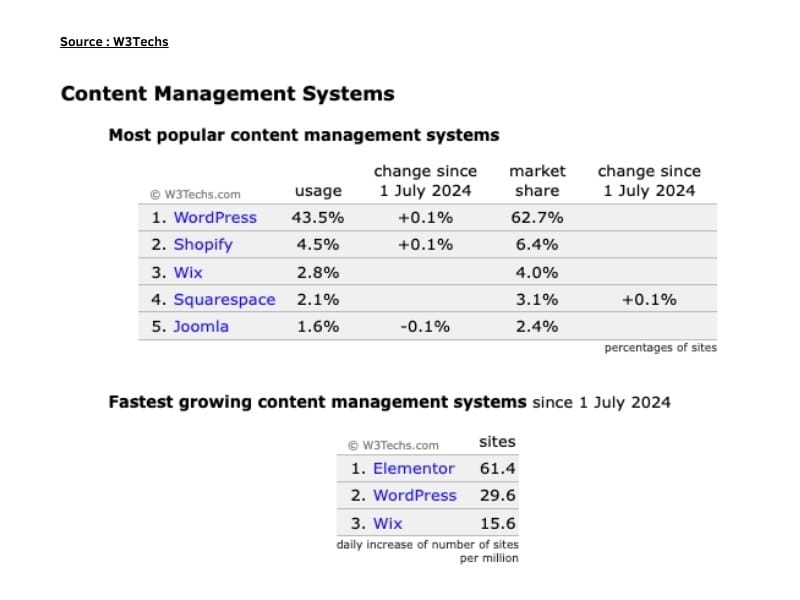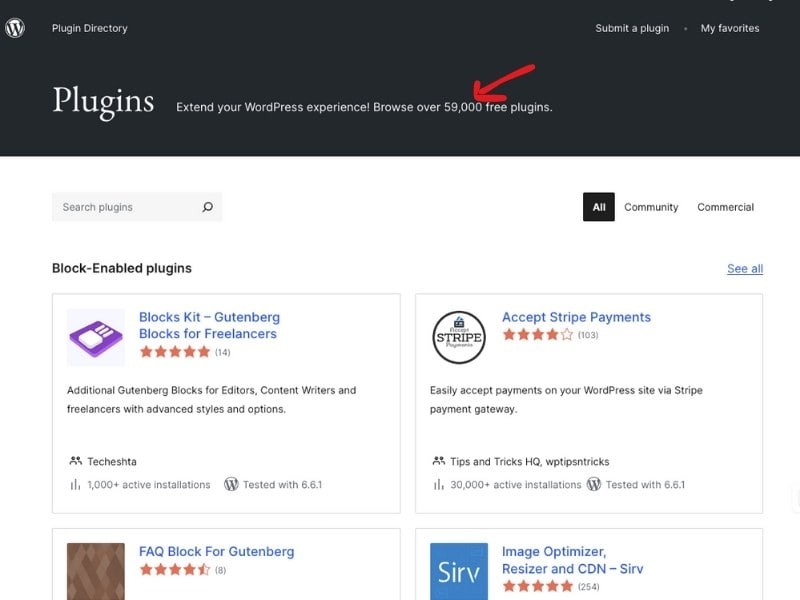Choosing the right website CMS can be challenging. If you’re considering a self-hosted solution, WordPress is a smart option. This open-source software allows anyone to edit its code, and plugins enable users to add functionality without needing to code.
As of 2024, WordPress powers 43% of all websites, an increase from 39.5% in 2021. It commands a 64.3% market share among CMS platforms, according to W3Techs. In 2011, WordPress was utilized by only 13.1% of websites.

Here are the 10 Reasons why WordPress is the best CMS choice for both businesses and individuals
User-Friendly Content Management System
Ease of Use: WordPress boasts a straightforward and intuitive dashboard, enabling users to manage content, menus, and settings effortlessly without any coding knowledge.
Learning Curve: New users can quickly get the hang of WordPress due to its simple design and abundant resources such as tutorials and forums.
Flexibility and Customization
Themes: WordPress provides thousands of free and premium themes, allowing users to effortlessly change their website’s design and layout with just a few clicks.
Plugins: With over 59,000 plugins available, users can enhance their website’s functionality with features like contact forms, SEO tools, social media integration, and more.

Custom Code: Advanced users can add custom code to themes and plugins for further customization, providing limitless possibilities.
Large Community and Support
Community Contributions: The vast WordPress community actively contributes to its development and offers extensive support through forums, blogs, and social media groups.
Professional Support: Numerous professional developers and agencies specialize in WordPress, offering paid support and services to users.
Documentation: WordPress.org offers comprehensive documentation and resources to help users troubleshoot issues and learn more about the platform.
Search Engine Friendly
Built-In Features: WordPress includes built-in SEO features like permalinks, metadata, and image optimization.
SEO Plugins: Plugins such as Yoast SEO and All in One SEO Pack provide advanced SEO tools and guidance to help users optimize their content and improve search engine rankings.
Mobile Optimization: Many WordPress themes are responsive, ensuring websites look and perform well on mobile devices, which is crucial for SEO.
Scalability
Small to Large Sites: WordPress can accommodate websites of all sizes, from small personal blogs to large corporate sites with thousands of pages and high traffic volumes.
Performance Optimization: With the right hosting and optimization techniques (like caching and content delivery networks), WordPress sites can maintain high performance as they grow.
Multisite Network: WordPress Multisite allows users to manage multiple websites from a single dashboard, simplifying the management of a network of sites.
Regular Updates and Security
Core Updates: The WordPress core is regularly updated to fix bugs, improve performance, and enhance security.
Security Plugins: Plugins like Wordfence and Sucuri Security provide additional protection by offering features such as firewalls, malware scanning, and login security.
Community Vigilance: The active WordPress community helps identify and patch security vulnerabilities, keeping the platform secure.
Multimedia Support
Media Library: WordPress includes a media library that simplifies uploading, managing, and using images, videos, audio files, and other media.
Embed Support: Users can easily embed content from popular media services like YouTube, Vimeo, SoundCloud, and social media platforms by simply pasting the URL.
Galleries and Slideshows: Many plugins and themes include features for creating galleries and slideshows to showcase multimedia content effectively.
Building a WordPress Website is Cost-Effective
Free Core Software: WordPress is free, making it accessible for anyone looking to build a website without a significant financial investment.
Affordable Hosting: There are numerous affordable hosting options specifically optimized for WordPress, allowing users to find a solution that fits their budget.
Free and Premium Options: While many free themes and plugins are available, premium options also exist at reasonable prices, offering advanced features and support.
E-commerce Plugin Integration
Woo-Commerce: As the most popular e-commerce plugin for WordPress, Woo-Commerce transforms a WordPress site into a fully functional online store with features like product management, payment processing, and order tracking.
Additional E-commerce Plugins: Plugins like Easy Digital Downloads and WP Simple Pay provide additional e-commerce functionalities tailored to different needs.
Extensions and Add-ons: Woo-Commerce and other e-commerce plugins offer a wide range of extensions and add-ons to enhance the online shopping experience, such as subscription services, booking systems, and advanced shipping options.
Multilingual Capabilities
Multilingual Plugins: Plugins like WPML (WordPress Multilingual Plugin) and Polylang enable users to create multilingual websites, offering translation management and language-switching features.
Global Reach: Multilingual support allows businesses and individuals to reach a broader audience by offering content in multiple languages.
Translation Ready: Many WordPress themes and plugins are translation-ready, meaning they can be easily translated into different languages using tools like Poedit.
The Current Market For WordPress Websites
Freelance developers and agency owners are increasingly adopting open-source software to avoid potential issues. Open source refers to computer code that is freely accessible for use or modification, and it supports a movement advocating for the open sharing of code, design, and resources.
Platforms like WordPress are becoming popular for creating websites and web applications, offering a cost-effective alternative to custom development or commercial products like Drupal or Joomla. Using WordPress allows freelancers and business owners to expand their portfolios and find more opportunities in a competitive market.
WordPress is currently the most popular Content Management System (CMS) on the internet, and its widespread use can be attributed to several factors:
- Ease of Use: WordPress is straightforward and user-friendly, requiring little technical knowledge to build a website.
- Affordability: Creating a WordPress website generally costs around $100, which is much lower than the cost of most custom CMS solutions.
- Versatility: WordPress can be used to build websites for any purpose, from small businesses to large corporations.
- Reliability: WordPress powers thousands of websites daily and is known for its stability and dependability.
- Comprehensive Features: WordPress provides all the necessary features, with an intuitive interface and customization options that make it a flexible and budget-friendly choice for any website needs.
Conclusion
WordPress stands out as the top choice for a Content Management System, offering unparalleled efficiency and effectiveness in managing website content. It provides a vast array of development services and features that are not available on many other platforms.
Whether you’re looking to create a personal blog or a professional website, WordPress delivers a robust and versatile solution. Its extensive range of tools and customizable options make it an exceptional choice for users who want to build and manage their online presence with ease.


